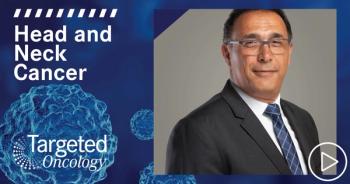
Targeted Therapies in Oncology
- September 2021
- Volume 10
- Issue 12
Neoadjuvant IO Response Suggestive of Long-Term Benefit in HPV– HNSCC
Responses achieved with immunotherapy preoperatively with could lead to lasting benefit in patients with HOV-associated head and neck squamous cell carcinoma.
Emerging data for neoadjuvant immunotherapy (IO) in patients with human papilloma-virus (HPV)–negative head and neck squamous cell carcinoma (HNSCC) suggest that responses achieved preoperatively could lead to lasting benefit, according to a presentation during the American Head & Neck Society’s 10th International Conference on Head and Neck Cancer.1
Ravindra Uppaluri, MD, PhD, noted during the presentation that ongoing trials are looking at the use of neoadjuvant IO across disease types of head and neck cancer because this approach may help induce an immune response to allow for durable benefit long after surgery and potentially reduce the need for added adjuvant therapies.
For patients with HNSCC specifically, relapse is still a major source of concern after surgery, so investigators are hoping neoadjuvant therapy for these patients would improve outcomes.
Uppaluri, chief of the Division of Otolaryngology at Brigham and Women’s Hospital in Boston, Massachusetts, explained that neoadjuvant immune checkpoint inhibition would activate the immune response against the primary tumor as well as regional lymph nodes. Because patients receiving neoadjuvant therapy have an intact immune system since they have not yet been treated, they would likely be more sensitive to treatment, and the immune system would then be primed for greater anti-tumor T-cell response.2 This can best be seen, Uppaluri said, in terms of pathologic tumor response after neoadjuvant therapy, which is an indication of activated immune response.
Currently, only a limited number of patients with HNSCC achieve a molecular partial response or pathologic complete response to single-agent neoadjuvant IO vs what has been seen in other tumor types, such as melanomas. Yet, up to 70% of patients with HNSCC do experience some degree of pathologic response.1
Emerging data suggest that even with any degree of pathologic response, there is still a benefit in patients in terms of delaying relapse. In a meta-analysis of neoadjuvant melanoma trials, any pathological response resulted in a greater recurrence-free survival (RFS) rate. In patients with pathologic complete response (pCR) the RFS rate was 100% at 2 years; in those with near pCR, the RFS rate was 89%, and it was 61% for those with pathologic partial response (pPR). With immunotherapy treatment specifically, the 2-year RFS rate was 96% for any patient with pCR, near pCR, or pPR.3
“We’re seeing this now in head and neck [cancer],” Uppaluri said.
In a study (NCT02641093) presented at the 2021 American Society of Clinical Oncology Annual Meeting of neoadjuvant pembrolizumab (Keytruda) in patients with HPV-negative, resectable, locally advanced HNSCC, 8% of patients had a molecular partial response and 38% had any pathological response. At 1 year, the disease-free survival rate was 100% in patients with a pathological response and 73% in non-responders (HR, 0.23; 95% CI, 0.06-0.81; P = .013). The overall survival rate at 2 years was 95% in patients who achieved a partial response and 61% in patients who did not respond (P = .00078).4
The study authors concluded that pathologic response could be a promising surrogate for long-term disease control.
Uppaluri suggested that a differential gene expression can be found between patients who respond pathologically and those who do not. In a phase 2 trial (NCT02296684) of neoadjuvant and adjuvant pembrolizumab in patients with resectable, locally advanced, HPV-unrelated HNSCC, the investigators looked to immunologic correlates of tumor response to neoadjuvant treatment and found increased expression of immune and inflammatory gene signatures in responders at baseline. Compared with patients who did not show a pathologic response, responders showed increased baseline expression of IFNG, CXCL9, CXCL10, and C XC L11 genes (P < .01; false discovery rate, < .2).5
“In patients who have responses...there’s a very strong interferon-γ signature. This is a known signature that...[can] predict pathological responses,” Uppaluri said.
Going forward, although encouraging data have been seen, Uppaluri noted that many unanswered questions need addressing and further research is needed in larger, randomized trials. Among those remaining questions, Uppaluri asked what the clinical impact will be for patients and how appropriate patients who will gain the most benefit can be selected to receive neoadjuvant treatment.
The ongoing phase 3 KEYNOTE-689 trial (NCT03765918) is one that Uppaluri believes will help to answer some of these questions. The trial is looking at the use of neoadjuvant and adjuvant pembrolizumab in patients with resectable, locally advanced HNSCC. In the study, patients will be randomized 1:1 to neoadjuvant pembrolizumab or no treatment, followed by surgery and then pembrolizumab plus radiotherapy with or without added cisplatin (based on risk category) or radiation with or without cisplatin alone. The trial is expected to enroll approximately 300 patients.
REFERENCES
1. Uppaluri R. Neoadjuvant immunotherapy prior to surgery for HPV-negative head and neck cancer. Presented at: American Head & Neck Society 10th International Conference on Head and Neck Can-cer; July 22-25, 2021; virtual.
2. Topalian SL, Taube JM, Pardoll DM. Neoadjuvant checkpoint block-ade for cancer immunotherapy. Science. 2020;367(6477):eaax0182. doi:10.1126/science.aax0182
3. Menzies AM, Amaria RN, Rozeman EA, et al. Pathological response and survival with neoadjuvant therapy in melanoma: a pooled analysis from the International Neoadjuvant Melanoma Consortium (INMC). Nat Med. 2021;27(2):301-309. doi:10.1038/s41591-020-01188-3
4. Wise-Draper TM, Takiar V, Mierzwa ML, et al. Association of patho-logical response to neoadjuvant pembrolizumab with tumor PD-L1 expression and high disease-free survival (DFS) in patients with re-sectable, local-regionally advanced, head and neck squamous cell car-cinoma (HNSCC). J Clin Oncol. 2021;39(suppl 15):6006. doi:10.1200/JCO.2021.39.15_suppl.6006
5. Uppaluri R, Campbell KM, Egloff AM, et al. Neoadjuvant and adju-vant pembrolizumab in resectable locally advanced, human papillo-mavirus-unrelated head and neck cancer: a multicenter, phase II trial. Clin Cancer Res. 2020;26(19):5140-5152. doi:10.1158/1078-0432.CCR-20-1695
Articles in this issue
over 4 years ago
Immune Checkpoint to Watch: ICOSover 4 years ago
Venetoclax Plus R2 Is Safe and Effective in Frontline MCLover 4 years ago
'Obesity Paradox’ Is Shown in Prostate Cancer

















